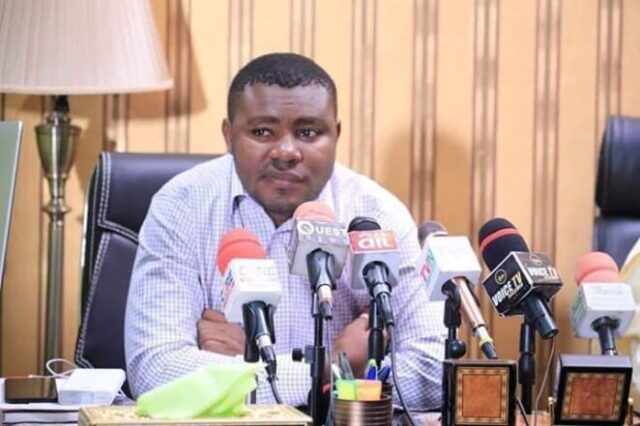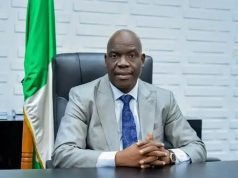By Philip Agbese
“The rule of law is the basis for any democracy. And without the rule of law in any democracy, you have chaos” –Meles Zenawi, Ethiopian soldier and politician.
Nigerians are exciting lovers of equity, justice and the rule of law. It is the reason, Nigeria’s statute books are replete with laws, which are periodically reviewed. The campaign for justice among Nigerians usually gain ascendency under democratic settings in the country. In the nation’s recent history, ex-President Umaru Yar’Adua was a strong advocate of justice and the rule of law.
The then Attorney -General and Minister for Justice, Chief Mike Kaase Aondoakaa, SAN, was the poster boy of the rule of law mantra under the Yar’Adua Presidency. After the expiration of that government, the rule of law seemed to have gone extinct to the angst of Nigerians. Does it therefore mean, the rule of law no longer exists in Nigeria? The answer is No!
Today, the emphasis on the rule of law is replicated by the administration of President Muhammadu Buhari. From the onset, President Buhari left no Nigerian in doubt about his avowal to run a Government of Nigeria premised on the words and letters of the rule of law.
President Buhari, like the retired Associate Justice of the Supreme Court of America, Justice Sonia Sotomayor clearly discerned and firmly believed, “… in the rule of law as the foundation for all of our basic rights.” He has been a stickler to this dictum in his leadership of Nigeria.
This mindset pulsated President Buhari’s advocacy and declaration in his inaugural day speech May 29, 2015 that; “The Federal Executive under my watch will not seek to encroach on the duties and functions of the Legislative and Judicial arms of government. The law enforcing authorities will be charged to operate within the Constitution…The judicial system needs reform to cleanse itself from its immediate past…It is only when the three arms act constitutionally that government will be enabled to serve the country optimally and avoid the confusion all too often bedeviling governance today.”
There is no gainsaying, President Buhari has walked his talk on the “Rule of Law” mantra, in his near seven years reign in Nigeria’s Aso Rock, the seat of power. Unlike his predecessors, Nigerians have experienced Mr. President’s due recognition and observance of the constitutional independence of the other arms of government in a democracy. His sermons are always centered on the non-interference with the operations and rights of other arms government as enshrined in the Constitution of Nigeria. That’s why he does not wear the toga of President and leader of his Party.
Buhari is tenaciously upholding the sanctity of the rule of rule, even where the people’s offensive indulgence into lawlessness bruises the pride of nation and defames or undermine his Presidency. And the enabler of Buhari’s towering heights in the compliance with the rule of law and the redefinition of the Nigerian Justice system is the current Chief Law Officer of the Federation.
The Attorney-General of the Federation and Minister of Justice, Barrister Abubakar Malami, SAN is law personified. He has fruitfully proven his mettle as an effective chief law officer of the federation. He has created innovative paths in ensuring the smooth administration of justice in Nigeria for effective governance based on the tenets of law as practiced by all democracies globally. He is strengthening old laws and engineering new legislations in areas where there are none.
Abubakar Malami is a translucent compliant with the rule of law. His office is active in offering genuine legal advice to government and appropriate interpretations of legislations in resolving thorny national issues. Minister Malami is silent or less vociferous about his assignments, but has many pluses to his credit. The justice minister has operationalized grandeur institutional reforms in the Nigerian Judiciary which have placed Nigeria in top ranking among nations in Africa attuned to the rule of law.
Barrister Malami has instituted solid sector reforms which have placed the Nigerian justice system on the path of expeditious dispensation of justice for the benefit of Nigerians. The Ministry of Justice has formulated multiple policies, and through the executive, it has sponsored fresh legislations to close up gulfs in existing laws and it has been relentless in offering appropriate legal advices in the prosecution of civil and criminal cases which have saved the FGN several trillions of naira in judgment debts these past six years.
Malami’s reforms in the justice sector reflects in the strengthening of the laws of anti-graft agencies, which have repositioned them for optimum performance. The result is the amazing volume of cases investigated and prosecuted by the EFCC and ICPC under the Buhari Presidency.
Under Minister Malami, Nigeria has domesticated legislations and international agreements, which have led to the passage and signing of Mutual Assistance in Criminal Matters Bill 2019 by President Buhari. And through Malami’s professional guidance, Nigeria has signed Agreements and MOUs with numerous countries to ginger international cooperation for the investigation, tracking, freezing and return of stolen assets which is actively operating.
In the area of prisons, the Minister of Justice has constituted a committee with the mandate of formulating policies and strategies for prison decongestion throughout the country. This is besides, the multiple legislations it has instituted before the National Assembly to backup the decongestion of prison formation process. The committee is working assiduously in clearing the backlog of cases of awaiting trials and those who have spent years in incarceration because of failure to pay minor fines imposed on them by the courts.
The Ministry of Justice under Malami has equally prosecuted various civil and criminal cases diligently. And through its sheer expertise, it has saved the FGN trillions of naira that would have been expended on judgment debts.
Justice delayed is justice denied. Nigeria has sustained a culture of interminable duration of cases before the courts. Therefore, Barrister Malami is working hard to end the reign of limitless court trials by defining a reasonable time-frame for justice delivery in Nigeria. What he is contemplating is restricting or pegging a 12-month time limit on the hearing of criminal cases from the High Court to the Supreme Court. Similarly, the succor to Nigerians will also extend to hearing and conclusion of all civil cases within 15 months from the day of its initiation across all the tiers of courts.
The initiation of the whistle blower policy of the Federal Government among other adjudgments effected in Nigeria’s legal system under the Buhari Presidency have strengthened the Nigerian judiciary. Therefore, delivering to Nigerians, an effective, trustworthy and flawless legal system are Malami’s salient reforms in the Judicial sector. Surely, it is another legacy, the Buhari Presidency will bequeath to Nigerians when its tenure eventually runs out in 2023.
Barrister Abubakar Malami will be remembered in Nigeria’s history as an incorruptible law officer who stood and defiantly defended the Constitution of Nigeria. He is likened to the likes of Justice Brenda Marjorie Hale, the Baroness Hale of Richmond, who served as the President of the Supreme Court of the United Kingdom (2017-2020) and famed for defending the Constitution. Malami is also famed for defending and protecting the Constitution at all times.








